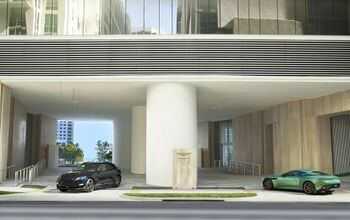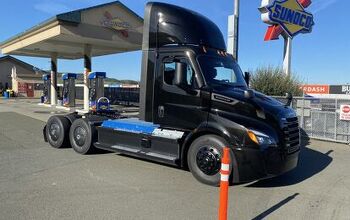Like Manual Transmissions, Handbrakes Are Also Hurtling Towards Extinction

We’ve long bemoaned the death of the manual transmission. But with few practical advantages other than being more enjoyable to a limited subset of the population, it’s quickly (and understandably) slipping into obscurity. It’s not alone. Based on research conducted by online automotive marketplace CarGurus, the good ol’ handbrake is also rapidly losing relevance as automakers shift their focus to electronic parking brakes.
Isolating its research to the United Kingdom, CarGurus claims just 37 percent of new cars leave the factory with a traditional, mechanical brake lever. And those that still have them are typically bargain-focused nameplates like Suzuki and Dacia. Considering neither of those brands sell any models here, the number is likely even lower in the United States.
“It’s official, the death of the handbrake is coming as manufacturers switch to electronic parking brakes in huge numbers,” stated CarGurus editor Chris Knapman. “Within the next few years we expect the number of cars on sale with traditional handbrakes to decline further, likely only to be found on a select number of niche models. Of course, the benefits can’t be ignored, but as the latest technology trickles through manufacturer line-ups, many new drivers might never experience one of the most familiar of automotive features.”
He adds, “The temptation to attempt flamboyant handbrake turns is soon to be a thing of the past, too!”
Any teenager confronted with a snowy, abandoned parking lot has intimate knowledge of this temptation. But handbrake hooliganism works equally well on a rainy cul-de-sac or bone-dry switchback. Of course, that admission should probably have been written in the past tense, since electronic brakes are the new normal. (Electronic stability control makes it harder than ever to pull this off in a new or newish car, even with a handbrake. You really need physics on your side. – Ed.)
While the electronic alternative undoubtedly frees up room on the center console, we’re definitely losing a bit of freedom here. This isn’t like moving away from lever-based throttles mounted on the steering wheel or the introduction of the electric starter motor. The car actually loses a fun little feature when it ditches the handbrake; it just happens to be a feature that’s frowned upon by the general public. But there is no stopping progress.
[Image: Ildar Sagdejev/ Wikimedia Commons ( CC BY-SA 3.0)]

A staunch consumer advocate tracking industry trends and regulation. Before joining TTAC, Matt spent a decade working for marketing and research firms based in NYC. Clients included several of the world’s largest automakers, global tire brands, and aftermarket part suppliers. Dissatisfied with the corporate world and resentful of having to wear suits everyday, he pivoted to writing about cars. Since then, that man has become an ardent supporter of the right-to-repair movement, been interviewed on the auto industry by national radio broadcasts, driven more rental cars than anyone ever should, participated in amateur rallying events, and received the requisite minimum training as sanctioned by the SCCA. Handy with a wrench, Matt grew up surrounded by Detroit auto workers and managed to get a pizza delivery job before he was legally eligible. He later found himself driving box trucks through Manhattan, guaranteeing future sympathy for actual truckers. He continues to conduct research pertaining to the automotive sector as an independent contractor and has since moved back to his native Michigan, closer to where the cars are born. A contrarian, Matt claims to prefer understeer — stating that front and all-wheel drive vehicles cater best to his driving style.
More by Matt Posky
Latest Car Reviews
Read moreLatest Product Reviews
Read moreRecent Comments
- Canam23 I've rented them and found them...fine. I wish Ford had continued with or came up with a new generation Fusion which was a far better sedan.
- MaintenanceCosts The ES will do well in an electric version, assuming it's more thoroughly baked than the half-finished RZ. There's plenty of the Lexus customer base who use planes whenever they travel and don't need to drive their own cars outside the metro area.
- Legacygt It was more than 20 years ago that the Bangle designed BMW sedans started looking a little bit awkward. But the lineup today is chock full of downright ugly vehicles. This is one of them.
- Jeff It does state in this article that Europeans as well as Americans have cooled on EVs. I can see push back from consumers on the 2035 deadline for EVs in Europe and in states like California. I have no problem with manufacturers offering EVs but many for at least now don't want EVs. Maybe GM instead of planning to do away with the Malibu to make more EVs should have offered the Malibu as only a hybrid like Toyota is offering the Camry for 2025. It would cost GM a lot less to offer a hybrid Malibu and it would outsell any EV that plant would produce. I even think GM would increase sales of the Malibu as a hybrid only and more competitive pricing.
- Kwik_Shift_Pro4X I fell asleep looking at that image.


































Comments
Join the conversation
growing without doing handbrake turns definitively decreases the amount of joy in your life
VW group Skoda Octavia still has a handbrake